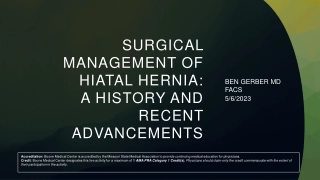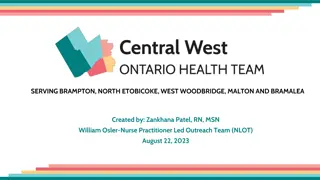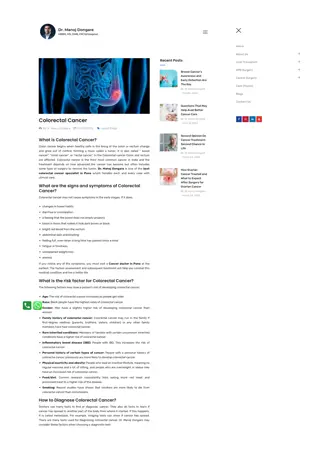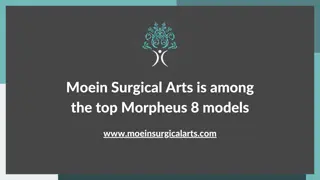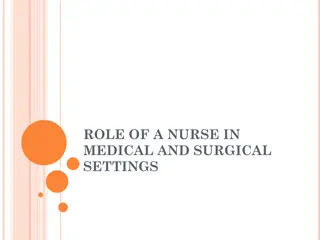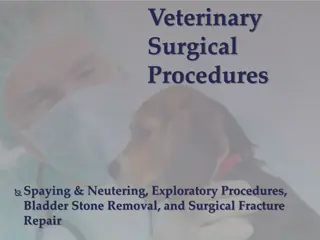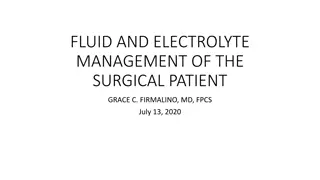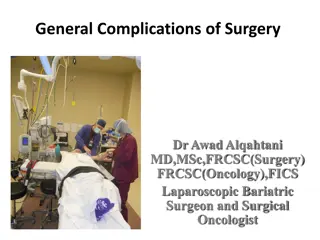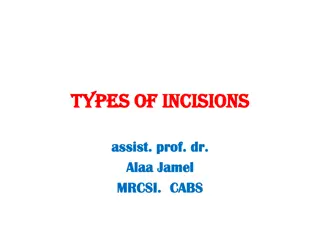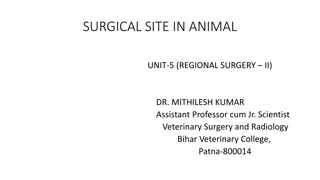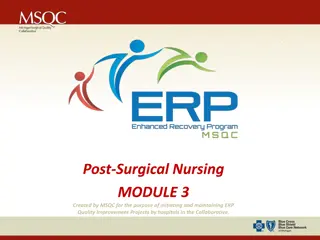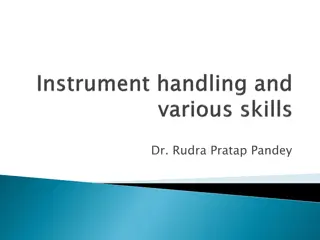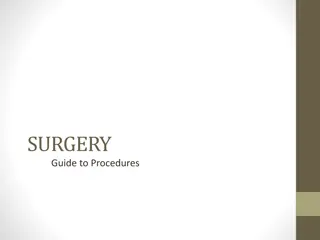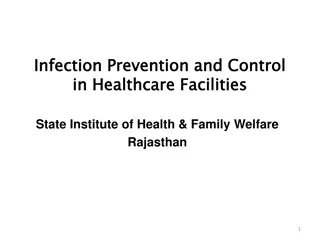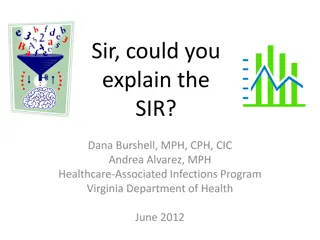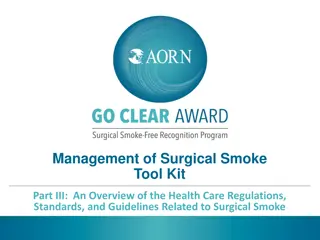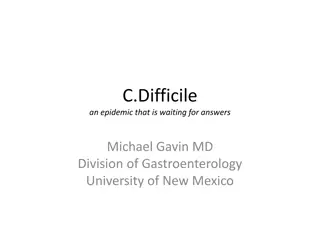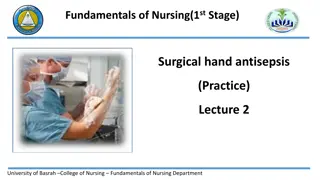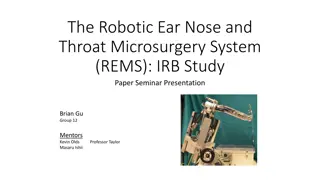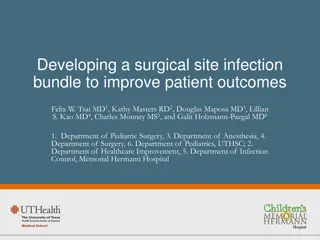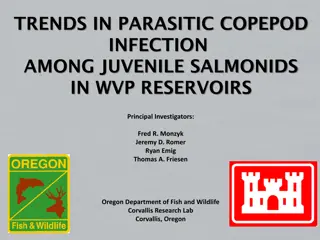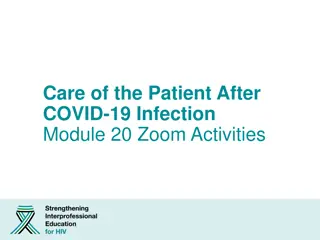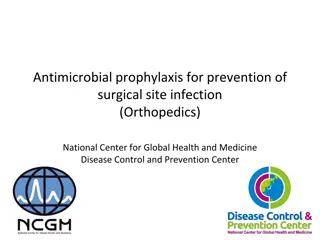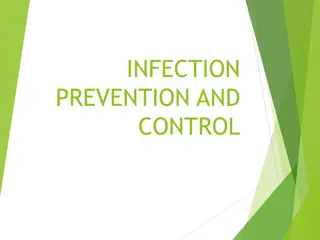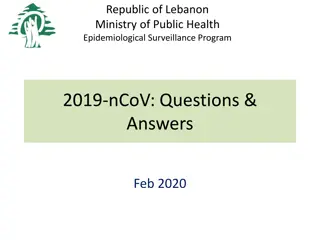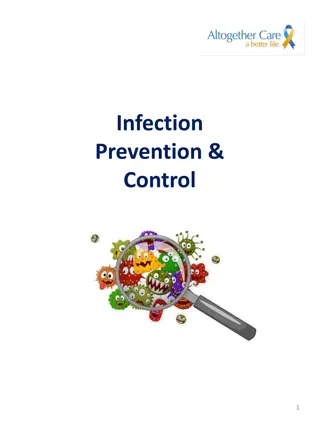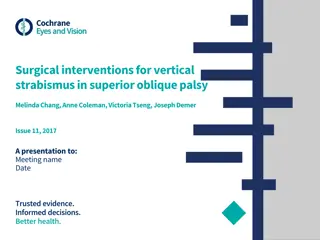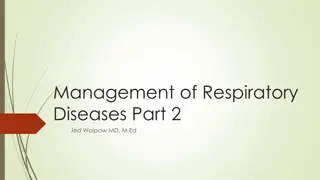Surgical Management of Hiatal Hernia
The history, advancements, and surgical options for durable hiatal hernia repair. Learn about the signs of symptomatic hiatal hernia and how modern repair techniques differ from prior surgical repairs.
13 views • 48 slides
Surgical Prophylaxis and Antimicrobial Selection Guidelines in Surgery
Surgical prophylaxis involves administering antibiotics before contamination of previously sterile tissues to prevent infections. Common pathogens in surgical site infections include skin flora like S. aureus. Antimicrobial selection is based on the surgical procedure, likely pathogens, and safety c
4 views • 19 slides
Periodontal and Peri-Implant Surgical Anatomy Overview
Sound knowledge of the anatomy of the periodontium and surrounding tissues is essential for successful periodontal and implant surgical procedures. This includes understanding the mandible and maxilla anatomy, muscles, anatomic spaces, and landmarks like the mandibular canal. Proper awareness can he
9 views • 41 slides
SURGICAL SITE INFECTION
Clinical scenario involving a 24-year-old male post-appendicectomy presenting with abdominal pain and concerns of wound infection. The tutorial discusses surgical wound infections, risk factors, prevention strategies, and principles of management, providing insights for approaching such cases as a s
7 views • 11 slides
Understanding Infection: Causes, Signs, and Nursing Management
Learn about the definition of infection, common causes, general and specific signs and symptoms, nursing assessment for foot ulcers and pressure injuries, as well as nursing interventions for infection prevention and management. Dive into the stages of infection, general and specific signs and sympt
0 views • 24 slides
Moein Surgical Arts Spider Vein Surgery in Los Angeles
You're looking for one of the greatest spider vein surgeons in Los Angeles. The most advanced non-surgical and surgical spider vein treatments accessible today are the specialty of Moein Surgical Arts. If you need more information, please visit our website.
0 views • 7 slides
Colorectal Cancer Treatment in Wakad Pune - Dr. Manoj Dongare
Dr. Manoj Dongare is one of the best colorectal cancer specialist in Pune which handles each and every case with utmost care. In his surgical experience, he performs many colorectal cancer surgeries successfully. His expertise in colorectal cancer surgery and surgical oncology makes him one of the b
0 views • 3 slides
Moein Surgical Arts is among the top Morpheus 8 models
For those seeking a non-surgical facelift alternative, Moein Surgical Arts provides one of the greatest Morpheus 8s in Los Angeles, USA. Please visit our website for further information if you require it.
0 views • 8 slides
Role of a Nurse in Medical and Surgical Settings
The primary role of a nurse in medical and surgical settings is to provide direct care to adult patients in various healthcare facilities such as hospitals, clinics, homes, and surgical centers. Nurses play a crucial role in outpatient departments (OPD), inpatient departments (IPD), intensive care u
0 views • 16 slides
Veterinary Surgical Procedures Overview
Veterinary surgical procedures such as spaying, neutering, exploratory surgeries, bladder stone removal, and surgical fracture repair are essential for maintaining the health and well-being of animals. Exploratory procedures help diagnose issues when other tests fail to reveal abnormalities, and sur
1 views • 31 slides
Understanding Fluid and Electrolyte Management in Surgical Patients
This article delves into the intricacies of fluid and electrolyte management in surgical patients, covering topics such as total body water distribution, fluid compartments, electrolyte composition, body fluid changes, and disturbances in volume, concentration, and composition. It explores the fluid
0 views • 25 slides
Importance of Surgical Head Coverings in Preventing Surgical Site Infections
Surgical head coverings play a crucial role in preventing surgical site infections by reducing the risk of microbial contamination and transmission in the operating room environment. Guidelines recommend covering the head, hair, and ears to minimize the shedding of microorganisms from surgical staff
0 views • 10 slides
Surgical Complications and Pre-Operative Preparations by Dr. Awad Alqahtani
Dr. Awad Alqahtani, an experienced surgeon, discusses the general complications of surgery, pre-and post-operative care, pre-operative preparation, patient confirmation, anesthesia choices, surgical positioning, types of injuries, and classification of post-operative complications. Covering topics l
0 views • 17 slides
Understanding Different Types of Surgical Incisions
Surgical incisions play a crucial role in accessing and treating various structures within the body. This article delves into different types of incisions, such as midline, sub-umbilical, paramedian, and pararectal. Each type has its own advantages and drawbacks in terms of access, healing, pain man
5 views • 23 slides
Surgical Sites in Animal Surgery: Techniques and Procedures
Incisions in animal surgery are crucial for various procedures like exploratory laparotomy, rumenotomy, and correction of intestinal obstructions. The most common incision sites in cattle include the flank and ventrolateral areas, each serving specific surgical needs. Proper technique during incisio
6 views • 21 slides
Enhanced Recovery Program Implementation in Post-Surgical Nursing
Introducing and implementing an Enhanced Recovery Program (ERP) in post-surgical nursing can significantly improve patient outcomes, experience, and satisfaction. This clinical pathway designed by MSQC aims to optimize patient recovery by standardizing protocols throughout the perioperative care pro
1 views • 26 slides
Surgical Instrument Techniques and Grips Overview
Explore a detailed guide on various surgical instruments, grips, and techniques including needle manipulation, tissue forceps usage, and artery forceps variations. Enhance your surgical skills and knowledge with practical insights.
0 views • 13 slides
Comprehensive Guide to Surgical Procedures Preparation
This detailed guide provides step-by-step instructions on patient preparation for surgical procedures, including patient prep, setting up sterile fields, and prepping the operative site. It covers essential aspects such as emplacing a tourniquet, washing the wound, performing preoperative irrigation
1 views • 40 slides
Understanding Proper Abdominal Incision Techniques in Surgery
Proper abdominal incision techniques are crucial in surgical procedures to ensure successful outcomes. Factors such as skin tension lines, anatomical structures, cosmetic considerations, and procedural access must be carefully considered when planning and executing incisions. The use of appropriate
0 views • 29 slides
Comprehensive Guide to Infection Prevention and Control in Healthcare Facilities
This comprehensive guide outlines the objectives, structure, responsibilities, common sources of infection, and principles of infection prevention and control in healthcare facilities. The program aims to minimize the risk of healthcare-associated infections, enhance healthcare worker adherence to I
0 views • 55 slides
Comprehensive Guide to Hand Hygiene in Infection Control
Hand hygiene is crucial in infection control, encompassing various methods like routine hand washing, antiseptic hand wash, and surgical hand antisepsis. Different types of hand hygiene include routine, antiseptic, and surgical antisepsis for removing or destroying bacterial infection. Indications f
0 views • 7 slides
Understanding Standardized Infection Ratio (SIR) in Healthcare-Associated Infections
The Standardized Infection Ratio (SIR) is a key measure used to monitor healthcare-associated infections (HAIs) at different levels. It compares observed HAIs with predicted values based on specific risk factors. An SIR > 1 indicates more infections than predicted, an SIR = 1 means observed equals p
0 views • 19 slides
Overview of Health Care Regulations and Standards for Surgical Smoke Management
This part of the surgical smoke management toolkit provides an overview of the health care regulations, standards, and guidelines related to surgical smoke. It covers various organizations such as AORN, ANSI, ECRI, IFPN, The Joint Commission, CDC, NIOSH, and OSHA, emphasizing the importance of contr
0 views • 17 slides
Surgical Skin Preparation: Importance and Best Practices
Surgical skin preparation is crucial to reduce microbes and prevent surgical site infections. It involves thorough cleansing to eliminate dirt, oils, and microbes while minimizing the risk of infection. Methods include mechanical friction and using antiseptic solutions like alcohol, iodine, and chlo
0 views • 34 slides
Understanding the Epidemic of C. Difficile Infection: Insights and Implications
C. Difficile infection is a growing concern, with a significant impact on public health in the United States. High rates of infection and mortality, particularly among the elderly, highlight the urgent need for effective prevention and management strategies. The burden of C. Difficile infection exte
0 views • 59 slides
Surgical Hand Antisepsis in the Operating Room Setting
Achieving effective surgical hand antisepsis is crucial in the operating room to reduce the risk of surgical site infections. This involves using antimicrobial agents and sterile brushes to remove debris and microorganisms, reduce microbial counts, and prevent rapid growth. The process requires equi
0 views • 21 slides
Infection Guidelines for Data Entry Scenarios
Guidelines for entering different infection scenarios into a database, including pre-implant infections, colonization cases, and handling multiple organisms in cultures. Clear instructions on what constitutes a major infection adverse event and how to accurately document various infection situations
0 views • 18 slides
Robotic Surgical Skill Evaluation in Sinus Surgery: A Comprehensive Study
The REMS project focuses on robotic ear, nose, and throat microsurgery systems, with one sub-project aiming to validate if robotic assistance enhances surgical skill compared to traditional methods. A key paper by Ahmidi et al. explores robotic path planning for surgeon skill evaluation in minimally
0 views • 23 slides
Developing a Surgical Site Infection Bundle for Improved Patient Outcomes
Developing a comprehensive Surgical Site Infection (SSI) bundle to reduce infection rates, including interventions like preoperative chlorhexidine baths, standardized antibiotic protocols, and targeted prophylactic measures. By implementing these strategies, the aim is to lower infection rates below
0 views • 24 slides
Trends in Parasitic Copepod Infection Among Juvenile Salmonids in WVP Reservoirs Study
Study conducted by the Oregon Department of Fish and Wildlife researchers to investigate trends in parasitic copepod infection among juvenile salmonids in WVP reservoirs. The study focuses on the prevalence and intensity of infection on the gills, comparing infection levels between stream-rearing an
0 views • 12 slides
Surgical Treatment and Complications in Gynecology: Review of Methods and Outcomes
Exploring the complexities of gynecological surgical procedures, this content delves into historical perspectives on prolapse and incontinence surgeries, the efficacy of various treatment approaches including weight management and surgical interventions like TVT, and the evolution of surgical techni
0 views • 26 slides
Patient Care Strategies Post COVID-19 Infection
Explore a module focusing on caring for patients post-COVID-19 infection, emphasizing a multidisciplinary approach, patient-centered care, and practical activities such as role-playing. Discover key considerations for managing ongoing symptoms, like fatigue, in patients like Daniel and his niece Gra
0 views • 18 slides
Antimicrobial Prophylaxis for Surgical Site Infection Prevention in Orthopedics
Surgical site infections (SSIs) are common and costly healthcare-associated infections, accounting for a significant percentage of nosocomial infections. Defined by the CDC, SSIs occur within 30 days of surgery and have clinical criteria such as purulent exudate, positive cultures, or surgeon diagno
0 views • 10 slides
Comprehensive Guide to Infection Prevention and Control
Understanding the essentials of infection prevention and control is crucial in healthcare settings. This guide covers key topics such as basic principles, standard precautions, specific infections, surveillance, and prevention methods. It explores the chain of infection, factors making individuals s
0 views • 65 slides
Guidelines for Suspecting and Managing 2019-nCoV (COVID-19) Infection
Guidelines provided by the Ministry of Public Health in Lebanon highlight the criteria for suspecting a 2019-nCoV (COVID-19) infection, including illness onset and exposure factors. It outlines symptoms to look for, such as fever and respiratory issues, as well as exposure scenarios like travel to C
0 views • 23 slides
Importance of Infection Prevention and Control in Healthcare
Infection Prevention and Control is crucial to safeguarding against the spread of harmful microorganisms in healthcare settings. This comprehensive guide covers the definition of infections, types of microorganisms, modes of transmission, the immune system's role, factors predisposing to infections,
0 views • 7 slides
Surgical Interventions for Vertical Strabismus in Superior Oblique Palsy: A Review
Binocular misalignment in superior oblique palsy often requires surgical interventions to address vertical strabismus, which can lead to visual issues and neck muscle problems. This review assessed the effects of various surgical treatments on individuals with this condition. Despite limited data pr
0 views • 10 slides
Environmental Issues in Infection Prevention: Addressing Challenges and Best Practices
Addressing environmental issues in infection prevention is crucial for maintaining a safe healthcare facility. The challenges include room cleaning during hospitalization, disinfection post-discharge/transfer, time constraints, cost containment, ongoing education, competency assessment, and outcome
0 views • 19 slides
Comprehensive Management of Respiratory Diseases: Anesthesia and Surgical Considerations
This detailed content discusses the management of respiratory diseases in surgical settings, covering aspects such as preop and post-op care, anesthetic techniques, monitoring, concerns like bronchospasm and auto-PEEP, and special considerations for thoracic and non-thoracic surgeries. The informati
0 views • 33 slides
Guidance on Intercollegiate Surgical Curriculum Programme Requirements
The Intercollegiate Surgical Curriculum Programme (ISCP) overseen by the Joint Committee on Surgical Training sets out annual requirements for surgical trainees, including assessments, feedback, and audits. Pitfalls to avoid include last-minute preparations and failing to reflect on learning experie
0 views • 9 slides
